Published on Apr 17, 2023
As young people transition to high school, building strong relationships with adults and peers is critically important. Research shows that students who experience a strong web of Developmental Relationships (DR) in their families, classrooms, youth programs, and faith communities are likelier to thrive. Yet, many young people do not experience Developmental Relationships, and that number tends to decline as they reach adolescence.
This blog will briefly discuss the Search Institute's Developmental Relationships framework and how the UChicago Network for College Success (NCS) utilizes it to help educators center student voice in their work. We will also share resources to help educators consider the best course of action to support and strengthen these relationships with their students.
What are Developmental Relationships?
Developmental Relationships are close connections with adults and peers that help young people shape their own lives, build resilience, and thrive. The Search Institute, an organization that promotes positive youth development, has identified five elements that make relationships powerful in young people's lives. These elements are…
-
Expressing care
-
Challenging growth
-
Providing support
-
Sharing power
-
Expanding possibilities.
